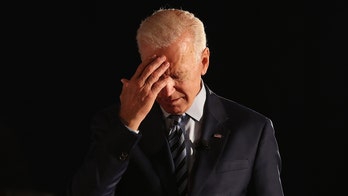
Former President Bill Clinton's mission to bring home two imprisoned American journalists from North Korea has catapulted him back into the international spotlight and scored an impressive diplomatic victory for the Obama administration.
But don't expect to see him in a sequel anytime soon.
"It was a very special set of circumstances," said Bill Galston, a senior fellow at Brookings Institution and former policy adviser to Clinton. "I have to imagine both the president and the secretary of state were acutely sensitive to the ambiguities of this situation. I don't think it's a signpost to his future role as a private citizen."
On Tuesday, Clinton secured the release of Euna Lee and Laura Ling -- reporters for his former vice president Al Gore's San Francisco-based Current TV -- after meeting with North Korean leader Kim Jong Il. The two had been sentenced to 12 years of hard labor for entering the country illegally. They were reunited with their families in Los Angeles on Wednesday.
Though in consultation with the White House, Clinton traveled to Pyongyang as a private citizen to retrieve the journalists. Upon their return, President Obama applauded the president, saying the administration was "extraordinarily relieved" that the pair had been set free.
The White House insists that the former president did not carry a message from Obama to Kim. The mission came as tensions have escalated between the nations over the communist regime's aggressive firing of missiles and ongoing development of a nuclear weapons program.
With such a success, some may be tempted to see Clinton in the role of re-igniting diplomatic relations with Iran or sent to work on peace negotiations between Israel and the Palestinians.
Don't count on it. Clinton is still a wild card.
"It's like sending in Bono or Sting," Rice University political scientist Bob Stein told the Washington Examiner. "The good news is that Clinton is a statesman, but the problem is, you don't always know what he's doing."
Not to mention, say others, Clinton is no Jimmy Carter.
"I would be surprised to see Clinton taking on a quasi-governmental role,"said Justin Logan, associate director of foreign policy studies at the Cato Institute, contending that former presidents typically prefer not to be demoted to deputy diplomats.
"On a certain level, it makes me uncomfortable," Logan added. "You don't want to get into the business of shooting former presidents out of cannons into foreign lands, not to deal with workaday diplomatic problems."
Logan said that if Clinton tends to address individual issues on a regular basis, "then everybody is going to be expecting a former president to come."
Michael Auslin, a foreign policy analyst at the American Enterprise Institute, said Clinton's stepping in to retrieve the two journalists raises worries about how the United States will deal with Iran for arresting three Americans for illegally entering the country from neighboring Iraq.
"Iran is obviously going to be looking at this," Auslin said. "They're going to be wanting the legitimacy of having the U.S. dispatch high-level negotiators and again for the same reasons. So the question is how do we stop it early and make very clear there are costs for this."
Auslin said it's important for the administration to make a stronger case when American citizens are arrested abroad.
"At one level, our hands are tied. We're not going to invade to get our people back," he said. "But the fact is ... we don't argue more forcefully in the beginning to get our people back, then (that) puts us in a position where we don't control the debate, we don't control the rhythm that goes on after that and we have to be forced into making some type of concessions."
Still, Galston said, Clinton's stony-faced demeanor and actions are "flawless" for the job of top envoy.
"He's obviously an enormously talented, persuasive man who knows who to conduct himself in public," Galston said. "I imagine some people in the administration are saying at this point, 'If he's willing to be a team player and stay within reach, who is better at arguing a given position?' If the Obama administration is sensible, it will see this is a talent to formidable and useful to be left on the shelf."




